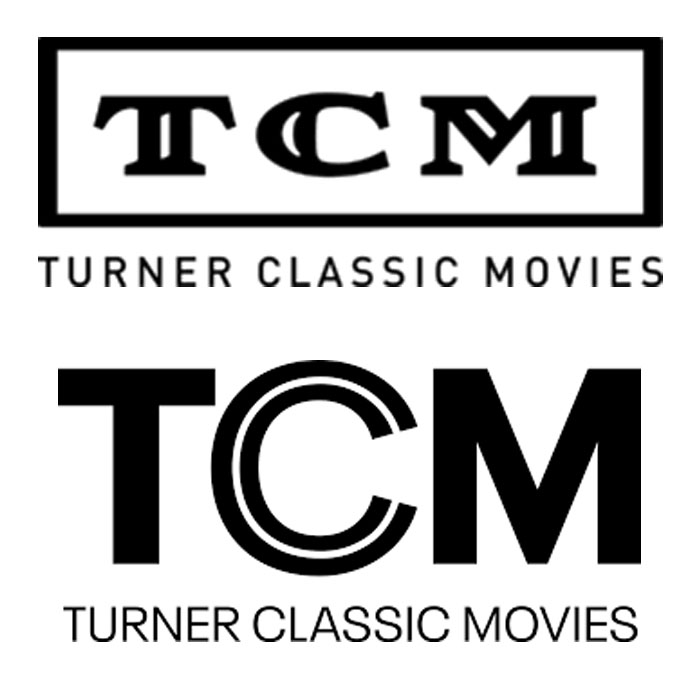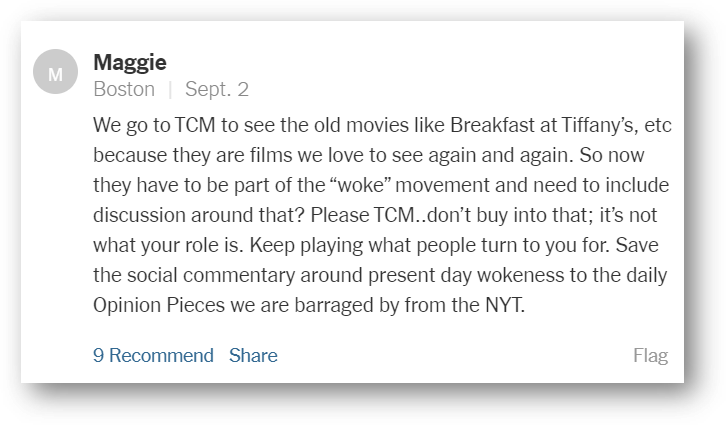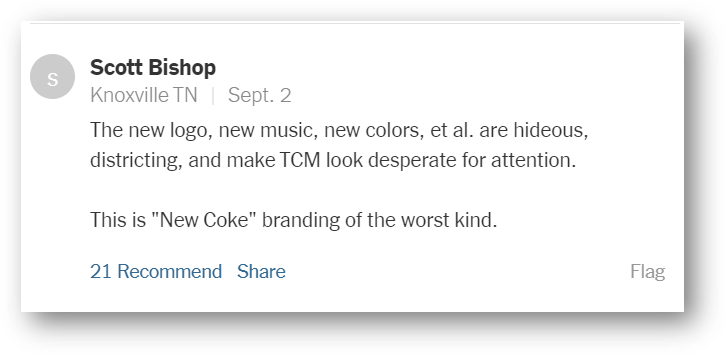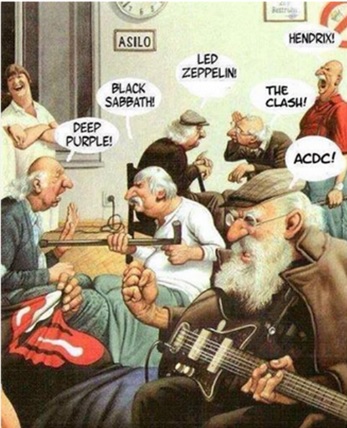
I’m sure many of you are facing a version of this dilemma right now.
Yours is an aging brand, with a loyal but less desirable demographic who clings to the status quo. They enjoy the classics – especially from the biggest stars – and they never seem to tire of them, no matter how often they come up in rotation. And did I mention, they hate change.
But there’s pressure from sales and corporate to deliver more sales-friendly demographics. Your mission is to attract more younger people, but you don’t want to alienate any of your diehard fans in the process. After all, they spend a lot of money, they’ve been with you for decades, and they’re your core.
And to make it more challenging, streaming platforms are beginning to eat your lunch, eroding your once comfortable position – and they don’t feature personalities or lots of talk – just one great classic after another.
So, how to make changes to the brand without causing panic among your meat and potatoes fans?
You could modernize the logo and the production, make your veteran hosts look and talk more contemporary, and ask them to provide more curation to your classic content. You might even come up with a new slogan – something catchy like “Where then meets now” to connect the past to today in an effort that might bring in some younger consumers, without pissing off the old guard.
And you could also go deeper into your library, storytelling about how some of the greatest classics were made and why they matter.
And maybe it would somehow work. But chances are, knowing your audience, your master plan could hit a pot hole. Or maybe even a sink hole.
That’s because when you mess with the classics – especially if you don’t respect them – there’s often hell to pay.
Can you think of a radio station that’s going down this road? Very likely, you can, because the scenario I described is what many Classic Rock stations are facing.
But the classic brand trying to give itself a facelift without anybody noticing isn’t a radio station – it’s a cable TV network.
TCM – Turner Classic Movies.
It’s been a successful cable TV franchise since Ted Turner launched his eponymous classic move channel himself way back in 1994, attracting a loyal – and vocal – audience. TCM is now owned by AT&T which bought Time Warner in 2019, and there’s obviously pressure from the top to make over the brand.
And everything I described earlier in this post is, in fact, happening as TCM undergoes its transformation it hopes finds younger viewers without alienating the base. The logo has been revamped (bottom right), and the hosts – including veteran Ben Mankiewicz – will be doing more curating, taking a more active role in providing context to TCM’s library.
has been revamped (bottom right), and the hosts – including veteran Ben Mankiewicz – will be doing more curating, taking a more active role in providing context to TCM’s library.
The refreshed TCM will also feature special programming in an effort to keep the content classic, but also contemporize it.
A new show, Reframed, is guaranteed to get attention. It takes a new look at old films, like Breakfast at Tiffany’s, which has recently come under fire for its take on sexuality, race, and gender.
 TCM calls it looking at classic films with “contemporary eyes.” Fans of the channel aren’t as upbeat about this “refresh” on their favorite channel.
TCM calls it looking at classic films with “contemporary eyes.” Fans of the channel aren’t as upbeat about this “refresh” on their favorite channel.
As you can see (left), Maggie from Boston isn’t buying it.
In fact, of the more than 300 comments that accompanied Dave Itzkoff’s review of the new TCM in The New York Times, the vast majority come from disgruntled and/or fearful fans, many of whom are worried about the fate of their precious channel.
majority come from disgruntled and/or fearful fans, many of whom are worried about the fate of their precious channel.
That sums it up for Scott Bishop (right) from Knoxville who wants no part of any of it. TCM may have tested its new look and approach in some type of research format, but its core fans are obviously skeptical.
I’ve heard the same sentiments in focus groups for Classic Rock stations where fans fret change, resisting any efforts by management to mess with the formula.
In the same way TCM fans revere icons like Gable, Hepburn, and Tracy, Classic Rockers feel that same sense of connection to Zeppelin, the Stones, and Queen.
 That’s because classic movies and Classic Rock songs aren’t just cinematic or musical works of art – they represent a precious piece of our lives. People vividly remember they saw The Maltese Falcon on that first date, or heard “Hotel California” playing on the radio when they met the love of their life or first set foot on their college campus.
That’s because classic movies and Classic Rock songs aren’t just cinematic or musical works of art – they represent a precious piece of our lives. People vividly remember they saw The Maltese Falcon on that first date, or heard “Hotel California” playing on the radio when they met the love of their life or first set foot on their college campus.
When you’re playing with the giants in any field, it doesn’t take much to spread discord among the loyals.
Of course, as we’ve learned in radio, fans may have a voice, but ultimately, it’s management that makes the calls. And if fans don’t like it, they can stop listening…
…and find another station in town or online, or pay a few bucks a month for satellite or a streaming service.
Will the TCM audience eventually calm down and roll with these changes? Management certainly hopes so, as they plot the continuing strategic journey of their aging cable channel.
Meanwhile, this rather innocent TCM video on Twitter was met with snarky pushback from fans and even some critics:
— God gave Rock n Roll to you ✝️🤘 (@WrenchSwinger06) August 26, 2021
Maybe there’s a lesson for radio execs thinking about messing with a good thing. Or maybe the wizards running TCM might be onto something here.
Nevertheless, TCM might end up being that canary in the pop culture coalmine.
Watch this space.
- Media And Technology In 2025: Believe It Or Not! - April 18, 2025
- In Radio, You Just Never Know - April 17, 2025
- The Secret To Making A Great Podcast (And Great Radio) - April 16, 2025




We can stop playing newer music around Hotel California and Led Zeppelin. Keep classic rock with titles from the 60s, 70s and 80s. Then, create a “classic” grunge format with titles from the 90s through today.
Funny, Mike. Our first iterations of the format (’83 or so) ended with the Cars, mostly because we could figure out what to do with the “new stuff.” Thanks for the comment.
You are so very right, Fred. My personal experience has been that younger listeners are listening to Classic Rock for the classics. Eliminating them, or playing them less frequently, does the opposite of what you want. You lose the lower end of 25-54.
I wish I could get more of my clients to understand this, Mike. It is counter-intuitive, but the younger consumers are more apt to be the Classic Rock “purists.” They want to hear the Doors, the Stones, the Who, and Queen. Thanks for making this point.
‘Pressure from the top’ says it all.
While keeping an eye on the balance sheet is important, I’m not sure that accounting should overrule the needs of the product/service being sold.
Perhaps it’s a case of sales deciding ‘that’s to hard to sell, so give me something I can sell easily.’
The only thing I am confident about is that there (always) needs to be more collaboration between business and creative and front line workers.
Paul, collaboration between the two departments IS something to aspire to. But to morph a perfectly good brand in order to meet sales configurations is usually a fool’s errand. It will be interesting to see how it plays out at TCM. Thanks for the comment.
Spot on once again, Fred. Creating expectations and then delivering upon those standards consistently and reliably — an integral part of successful strategies.
Thank you, Rob. We’re all living the dream, right? Congrats on helping make Classic Rock come alive for a wide spectrum of Chicago fans.
Bingo!
“We’re “here” for Zep, the Stones, Van Halen and the like. Play the Chili peppers, and I switch stations.”
-Me
2019
There are a lot of “me’s” out there, J.C.
As a big TCM fan, I’m okay with any changes to the window dressing they make. Why? Because the core mission is the same — play the great movies of the past, bring context to them. A glance at their schedule over the next few weeks shows they’re continuing to do just that.
Nathan, I don’t think they’re going to turn the place upside-down. But this is an audience that fears change. Clever stunts may get some attention among non-TCM viewers, but the core fans are understandably wary. We’ve all been victims of the “TV cancel culture.”
I was the poor bastard who put “Timeless Love Songs” on the air. Seemed like a great idea. It was supposed to be a new “hip” version of Easy Listening. John Mayer, Norah Jones, Michael Buble, but it leaned heavily on cruise ship singers.
We had to do something to freshen it up but to our owner at the time, this seemed like the best route. Our massive sports schedule of Baseball and College sports and 6 hours of Religion on Sunday only made things worse in our Medium size market.
There are lots of dead stations on radio’s “boulevard of broken formats. I’ve seen some Classic Rock formats trashed for trying to become something they’re not. Fortunately, the good ones have survived, and the great ones have thrived.
How have they survived? I am deeply curious. I find the Classic Rock format survival question fascinating. How does it keep from fading to black like the songs from the fifties and sixties have. What happens in ten, twenty years as the target audience starts passing away in greater numbers? For every angry old man telling people to get off his lawn, there’s a for sale sign in that lawn a little down the road. How do you bring the young people in past that angry old man before that Century 21 sign goes up? I feel that the key to survival for all aging formats hides in the answers. Keep up the good fight. Write if you get work.
Oh, Dave, you’re getting all existential on us…and we’re just talking about old rock ‘n roll songs.
You know, if it was just about following the core demographic, Classic Rock would skate off into the sunset with its Baby Boomer fans intact. The question is whether the music has generational staying power – like Beethoven or Benny Goodman or Count Basie – discoverable and enjoyed by future generations.
Is that how it will work for the Beatles, the Doors, and the Eagles or will they go the way of Danny & the Juniors and the Big Bopper? It will be fun to watch how this sorts out. Thanks for the comment.
Maybe Xperi needs to subsidize the manufacture of a standalone HD Radio tuner (with a small screen for the graphics) that listeners can just plug into the AUX inputs of their home stereo or Bose radio. This could enable stations to multicast and meet both interests–the unabated classics and the newer stuff too. Only question then would be which one stays on HD1 and which goes to HD2 or HD3? That is, which demo is more likely to make the effort of retuning to get what they want?
Have your cake and eat it.
I think we’ve all heard that people are more apt to complain than they are to compliment.
Programmers are being taught to hit your core audience at the most influential age of their teen years when their musical tastes were formed. If you aim for the middle of a 25-54 demo, you are looking at a 40-something person. That person’s musical tastes were formed in the late 80s and early to late 90s. However, their parents were listening to the music of the late 60s and 70s.
All of this being said, a combination of all these decades will give a Classic Rock station the sound of nostalgia it needs and the music a Classic Rock listener wants.
Listeners have called and complimented and complained about the diversity of music. We don’t program to a single person, we program for the masses.
Lara, audience targeting can be a challenging endeavor. And when you have a format like Classic Rock where the “if you were born in 19__, you’ll love the music that was popular when you were a teen” rule is broken, it can be even gnarlier. And yes, listener complaints go with the territory.
Maybe my head is in the sand, but I don’t hear classic rock fans complaining about Nirvana playing next to Zeppelin and the Stones. Probably because it’s next to Zep and the Stones. If you program the station thoughtfully, it fits. Great stations respect the music and make everything flow.
As for TCM, as long as Discovery doesn’t start running Ghost Adventures and 90 Day Fiancé on the channel when they take it over, it’s probably going to work out fine. And as with radio, as long as they respect film, they can keep people’s trust. Some people are just going to fear change no matter what, but thoughtful programming can keep an audience. You just have to prove to them that you care.
John, some fans care…and some don’t. A hit is a hit, but that doesn’t mean you want to hear it on your favorite Classic Rock station. For me at least, it’s about understanding why they come to you in the first place – what is your job to do. Thanks for the comment.
Those rules are coming from great consultants who I listen to through the blogs of All Access, Radio Ink, and webinars. As I drove across Washington state last night, there wasn’t a single classic rock station out off the 4 (KZOK & KGON particularly) that didn’t mix in 90s rock with the staples.
Lara, I have several clients who integrate ’90s but others who don’t. Because it’s situational. Who’s in your building and who’s across the street? How well do you research your audience or are you programming from Mediabase?
I’m another of those consultants who blathers in the trades. And when we do that, we speak in generalities, not specifics. To simply do what Mike McVay or Buzz Knight or Ken Benson or Fred Jacobs are talking about in blogs without applying it to your market and your audience is irresponsible.
It is dangerous to say they’re doing it in Seattle if you don’t see their data or know their strategic situation. Thanks for the comment.
I think it was Darrel Royal who said, “ya gotta dance with who brung ya”. I’ve seen plenty of research that says old rock isn’t classic rock. Smells Like Teen Spirit may be older than Mary Jane’s Last Dance, but it doesn’t smell like classic rock and Mary Jane does.
it is what it is. I also don’t know how bad the demos are these days, but fast forwarding from when I did and the picture probably isn’t pretty. I think it was in City Slickers where Billy Crystal says that there’s nothing wrong with his job, that he just needs to do it better. Making classic rock better, not different might work. I remember when WBCN was #1 (12+ and most major demos) in Boston – but they had two full time production directors, a real marketing person in charge of their promotion, a monster morning show and great personalities all day and night. Maybe that’s the best way to rejuvenate classic rock. IT doesn’t seem as though adding grunge will do much but annoy core CR listeners.
You know, it’s times like this where I wish you were running radio stations again.
Never worked with you Mr Bellin, but I wish I had.
Similarly on the classic hits side, I’ve kept the Beatles, Elton, CCR and some other late 60s/early 70s staples on my station. It’s not for the 55+ audience, it’s for the 25-34 demo that has recently become fans. Looking at Rolling Stone’s Top 500 artists that is based on song streams, all current acts until No. 45, The Beatles. Fleetwood Mac, Queen, and the Stones are also in the top 100. We have moved into the 90s with songs that fit the feel of the station but the core artists are, well, the core sound.
Keith, you beat me to what I was going to say.
At my classic hits station, the songs that resonate with our listeners the most — I know because I ask them — are the late 70s to early 80s. Still a smidge of late 60s in the mix, but they’re the songs the younger end of the demo love.
Thanks, Don, for confirming what we also see here, there, and just about everywhere.
Absolutely, Keith. I’m seeing this happen all over the place. Thanks for commenting.
TCM is somewhat boxed in here, as it can’t do what American Movie Classics–er, AMC–did many, many years ago. Not only did AMC do it first, but TCM still has the other heritage Turner brands to deal with.
In terms of what Classic Rock “should” be, I concur that there’s more a type of shared feeling or tone than just a common timeframe. Still, that’s not really at all unique to Classic Rock (or, for that matter, Classic Hits); for me, it definitely also applies to, e.g., Alternative/Modern Rock (which might help explain why I still dislike using the term “Alternative” in most commercial contexts).
We’re on the same page with Alternative. Even fans hate it. That was another of Classic Rock’s assets – fans liked the name and used it freely to talk about the music. There’s a lot to be said for positive branding. Thanks for the comment.
Allow me to state the obvious…. do people still really have cable? I didn’t even know TCM still existed.
John, I’m sure you speak for many cord cutters out there. Yeah, maybe that’s a bigger problem for TCM.
I always go back to “Focus” by Al Ries. Owning a category is the most powerful driver of success in marketing. Brands evolve, of course but those that dilute their essence lose in the longterm.
Andy, that’s how I was taught, too. And it has served me well.
Maybe classic rock can take a leaf out of the AC book. A lot of these stations play 40 years of music, and yet still make their format sound cohesive.
There’s a station near me that schedules 3 songs from the ’80s, 3 from the ’90s, 3 from the ’00s/’10s and 3 current hits every hour. So, for instance, you might hear “Little Lies” by Fleetwood Mac followed by “Take My Breath” by the Weeknd.
Believe it or not, it’s the most popular station in town, achieving its highest ratings in the 25-34 age group. These listeners are hearing tracks that were recorded before they were born, mixed in with the current top 40, and they love it!
Andrew, thanks for this. I appreciate what this station (and others are doing). It is very much a matter of knowing your market, the competition, and where there are opportunities. And as us consultants are fond of saying, no two markets are alike. Thanks for chiming in.
My eyes were opened at a music test in 2007. I watched younger adults respond more positively to 70’s songs than 90’s songs (I was taking over an AC in the Midwest – one that was playing a lot more 90s than 70s at the time). In one book, we dropped the average age of the listener by raising the average age of the songs.
But no matter what age or era of music you are playing, you still have to have a contemporary outlook and viewpoint. Jocks needs to be in the here and now, not the past and gone.
Very interesting. Could it be that, in 2007, music from the ’90s was recent enough that the youngsters still remembered what wasn’t being played as well as what was, and they felt the programming was insufficiently deep; while the ’70s were far enough back that the young listeners were less aware of what was being omitted from the programming, so the playlist of greats didn’t spur thoughts of, “Yeah, that’s good stuff but why aren’t you playing those deep album cuts I remember?”
Interesting thought, John. And over time, people tend to be more forgiving and nostalgic.
“Jocks need to be in the here and now, not the past and gone”. 👏👏👏👏
Best comment on here.
Agree!
The conundrum that I am puzzled by with the “traditional” classic rock format is that it’s programmed to reach Baby Boomers (and maybe the children of those boomers who grew up listening to that music).
As a proud card-carrying member of Gen X, I have a love/hate relationship with the classic rock format. I grew up listening to it. I love The Who, The Kinks, Zeppelin, etc. But when I got to high school in the early 80s, I discovered bands like R.E.M., The Replacements, Chili Peppers, etc. Then, in the 90s as I was out of college and starting my career, grunge happened. But, when I listen to most classic rock stations, all I hear is the music from the 70s that I grew up on and then the hair metal of the 80s that I detested.
In fact, just last week, I was driving home from a mini-vacation over the long Labor Day weekend and I was scanning stations through Massachusetts, Connecticut, New York and Pennsylvania on my drive. It was Tuesday. I hit a lot of classic rock stations. They were all in “Two-fer Tuesday.” I heard AC/DC, Zeppelin, Tom Petty, etc. multiple times during that drive – and two songs back to back from each of them! I also heard a fair amount of Slaughter, Motley Crue and other hair metal that made me hit “Scan.” The only difference was that I heard a “two-fer” from Nirvana at one point.
I’ve always said that if there was a station that just played all the music that I liked, I would be the only listener, but I feel like there has to be a successful compromise to attract Boomers and Gen X-ers and not alienate either one.
Don, thanks for the comment & the “Gen X Challenge.”
Where do I begin? Right here with a quote from your final comment:
“I’ve always said that if there was a station that just played all the music that I liked, I would be the only listener, but I feel like there has to be a successful compromise to attract Boomers and Gen X-ers and not alienate either one.”
Every programmer probably rolled their eyes a bit, because it sounds so simple. But it’s not.
Every human – no matter the generation – has a radio station in their heads that is uniquely different from everybody else. Trying to satisfy the greatest number of listeners at the same time (which is the mission in commercial radio) without sounding bland, boring, or repetitive is every PD’s goal.
Every individual has favorite groups, as you note. And yes, Twofer Tuesday – while long in the tooth – is something that still works in a lot of places. But I think the other side is that everyone has artists they can’t stand, or songs that are like nails scratching on blackboards. As a wise man once said, “You can’t please everyone.”
I hope this provides some clarity. Thanks again for taking the time.